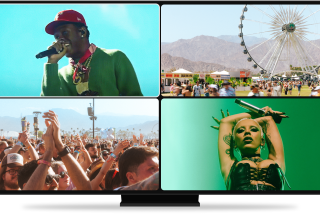How many screens do you need to watch TV?
You probably do it now without even thinking about it, and that makes you part of the 86%. That’s the percentage of smartphone owners in the U.S. who are split-screening -- using the device while watching TV -- at least once a month, according to Nielsen.
When it comes to tablet owners, 88% of them tap their devices during TV time at least once a month. For 45% of tablet users, supplementing the TV screen is a daily activity, and one-quarter do it several times a day. Smartphone users’ habits were comparable.
Why would TV watchers need a second screen?
Commercial breaks, if you actually watch live TV, make for a perfect opportunity to check email, scroll through Twitter, comment on Facebook or look up that actor’s name that’s just on the tip of your tongue. Always-on multitasking has become a way of life for many of us.
And these days, nearly every show, newscast and commercial caters to dual-screen viewing, with hashtags popping up in various corners of the TV screen, interactive elements integrated into newscasts, Shazam notices in ads for more on the music.
Some shows invite smart-screen surfing to supplement their content. “Fringe” fans, for instance, know to check FringePedia while watching the show to decipher the code in the glyphs in the pre-commercial slate or figure out when they missed an Observer appearance in that episode.
Watching TV while also using a tablet or smartphone isn’t exclusive to the U.S. Brits, Germans and Italians are doing it too, Nielsen said. However, Germans and Italians were less likely than Americans and Britons, with 29% in Germany and Italy saying they’ve never mixed tablet use and TV consumption.
RELATED:
Police tracking of cellphones raises concerns1 in 5 U.S. adults has read an e-book, survey says
Google’s Android has 50.1% share of smartphone market, study says
Follow Michelle Maltais on Google+, Facebook or Twitter
How many screens do you need to watch TV?
More to Read
Inside the business of entertainment
The Wide Shot brings you news, analysis and insights on everything from streaming wars to production — and what it all means for the future.
You may occasionally receive promotional content from the Los Angeles Times.











